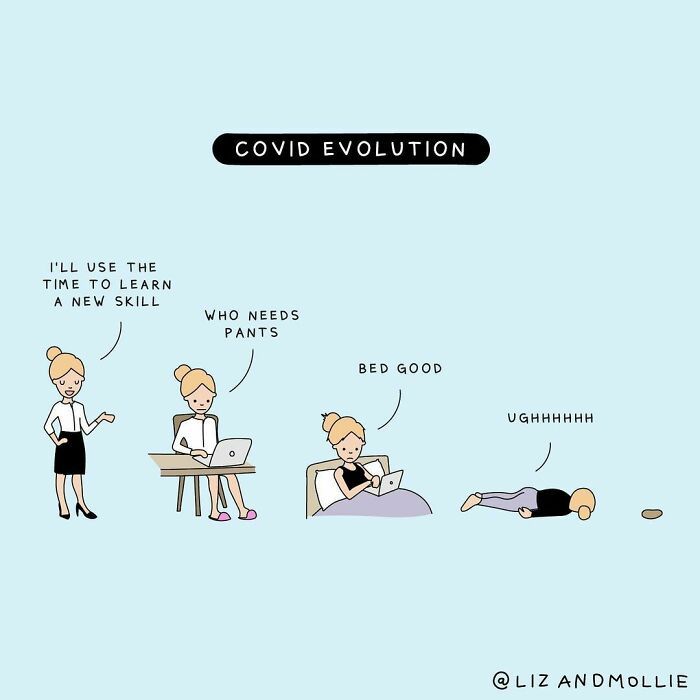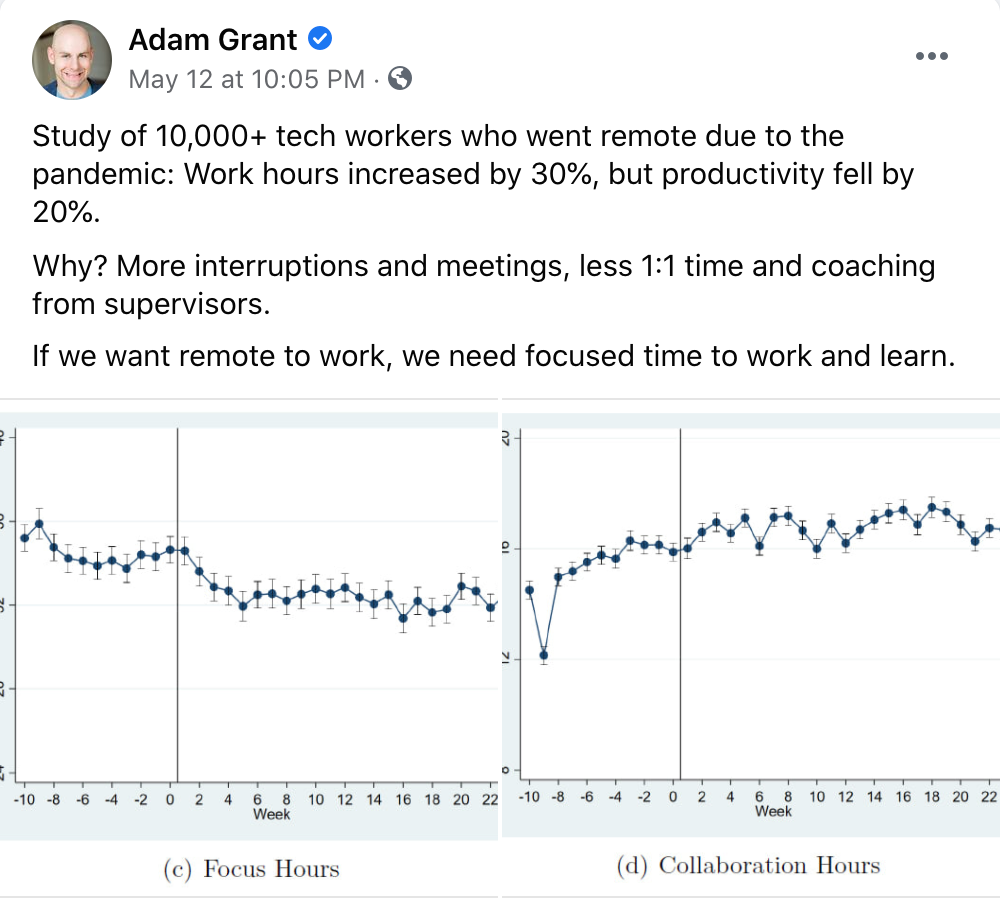Deep Work is a Trap: To Thrive in a Remote World, Learn To Context Switch

We're over a year now into the Great Remote Work experiment, and after a honeymoon period where everyone got plants and dogs and found favorite yoga YouTubers, many people are now at the 3rd or 4th stage in this pic:

I posit that part of it is just the natural progression of learning a new style of working. Remote is pretty unnatural. Even those of us who were sort-of remote before Covid still needed an adjustment period. My friends who were in more 9-5 industries had to make a cold switch and it was definitely harder on them.
It's not just a "feeling" either. We're staring to see some longitudinal data that helps us put our finger on what's happening.
"Focus hours" (aka. deep work time) is down and "collaboration time" (think: talking to other people) is up. The net-net is that productivity is down, even if total hours are up:

People are fighting this by doing things like No-Meeting-Wednesdays or having company-wide policies on Slack and chat usage.
All of these in an effort to reduce "Collaboration Hours" and give people more "Focus Hours." I think it is noble, and needed in the short term to help people cope while they find a new personal productivity equilibrium.
I'm skeptical.
Look again at those charts above. When you see trendlines like that, they speak to persistent, lasting changes in something. The chart on the left is like, if you have an app that has shitty retention that is slowly bleeding users.
The chart on the right reminds me of when you've set up a content marketing machine and it's slowly and surely starting to work.
My interpretation of the chart trendlines is that there are fundamental shifts happening that don't get reversed without a lot of effort.
When you have an app that people just don't come back to (coughClubhousecough) it's REALLY hard to get them back if you just change a feature or two. Sure, it happens. But it's really really freaking rare.
So I propose that the way to "deal" with this current phase of the Great Work Experiment is to lean into the constant disruptions and learn to deal with them. Because I think you'll be an overall more productive person if you do.
Picture two people dealing with this familiar situation:
You have family (kids/parents) at home. You have a puppy. You also have a spouse also working at home. The doorbell rings randomly throughout the day: it's all those ecommerce and grocery deliveries. Because of all the time you spend at home, the house gets dirty, so there are more dishes and vacuuming and tidying that constantly needs to be done. All of this on top of your phone notifications, work problems and work conversations to manage.
Person A: the believer in deep work. This person is totally screwed. The likely scenario is this person signs up to go back to the office part-time to escape the chaos at home, because if they don't, they'll be miserable and anxious and stressed all the time at home.
Person B: the context switcher. This person actually has a chance to thrive. Because instead of getting frustrated that they can't get 20 minutes to think, they've built in systems and processes to allow them to get interrupted and get back to work with minimal switching costs.
Person A is most people. Desperately trying to cling to a world where they had more control over their schedule because they were at the office.
Person B sounds fictional, I'll admit. But I've met this person so many times. One of my previous bosses was the embodiment of this. I asked him how he did it. He said something like:
"Context switching is a skill, one that most people don't bother to develop. It's like lifting weights for your mind. If you choose to do the hard work and strengthen the muscle, and practice it every day, nothing the world throws at you will stress you out."
He came from a programming background, which is notorious for its don't-bother-me-I'm-coding culture. But he understood that context switching is one of those core skills that separates leaders from foot soldiers.
If you've ever seen the schedule of Directors or VPs or the C-Suite of your company, you know that their job is all context switching. Back to back to back meetings. If not meetings, back to back tasks. Constant fires to put out, constant problems to manage. There is something happening all the time.
As you progress in your career, you have no choice but to get good at context switching
Here are a few things that have been helpful for me in developing my context switching muscle.
How to make your phone work for you (not against you). Even if you're not sold on my thesis that context switching is most important meta-skill you have to develop in a remote world, you should read this.
Maker's schedule, Manager's schedule. You can control some of the chaos by blocking off your days in "collaboration hours" and "focus hours." The crux is that if you live with others, you have to fit everyone's your schedules around this, not just your own.
Pomodoro technique. If you're reading this blog, I'm sure you've heard of this. This has been one of my keys for not going crazy while WFH. The critical – and most often ignored – part of pomodoro is respecting break times. That's where most people screw up.
Build in a journaling habit. If you know me in real life, you know I'm always hyping up journaling. Frankly, there has never been a more important time to pick up this habit. Because of our increasing hyperconnectedness, it's rare that you actually have "alone" time with your own thoughts. When you turn down the volume on everything else and just listen to yourself, you'll be surprised what comes out and how great you feel afterwards. I know I always am.